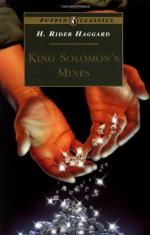At sunset on the second day, we stopped to rest awhile upon the summit of some heights over which the road ran, and there on a beautiful and fertile plain before us lay Loo itself. For a native town it is an enormous place, quite five miles round, I should say, with outlying kraals projecting from it, that serve on grand occasions as cantonments for the regiments, and a curious horseshoe-shaped hill, with which we were destined to become better acquainted, about two miles to the north. It is beautifully situated, and through the centre of the kraal, dividing it into two portions, runs a river, which appeared to be bridged in several places, the same indeed that we had seen from the slopes of Sheba’s Breasts. Sixty or seventy miles away three great snow-capped mountains, placed at the points of a triangle, started out of the level plain. The conformation of these mountains is unlike that of Sheba’s Breasts, being sheer and precipitous, instead of smooth and rounded.
Infadoos saw us looking at them, and volunteered a remark.
“The road ends there,” he said, pointing to the mountains known among the Kukuanas as the “Three Witches.”
“Why does it end?” I asked.
“Who knows?” he answered with a shrug; “the mountains are full of caves, and there is a great pit between them. It is there that the wise men of old time used to go to get whatever it was they came for to this country, and it is there now that our kings are buried in the Place of Death.”
“What was it they came for?” I asked eagerly.
“Nay, I know not. My lords who have dropped from the Stars should know,” he answered with a quick look. Evidently he knew more than he chose to say.
“Yes,” I went on, “you are right, in the Stars we learn many things. I have heard, for instance, that the wise men of old came to these mountains to find bright stones, pretty playthings, and yellow iron.”
“My lord is wise,” he answered coldly; “I am but a child and cannot talk with my lord on such matters. My lord must speak with Gagool the old, at the king’s place, who is wise even as my lord,” and he went away.
So soon as he was gone I turned to the others, and pointed out the mountains. “There are Solomon’s diamond mines,” I said.
Umbopa was standing with them, apparently plunged in one of the fits of abstraction which were common to him, and caught my words.
“Yes, Macumazahn,” he put in, in Zulu, “the diamonds are surely there, and you shall have them, since you white men are so fond of toys and money.”




